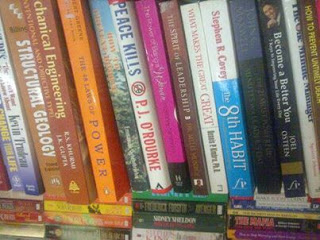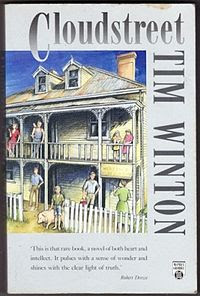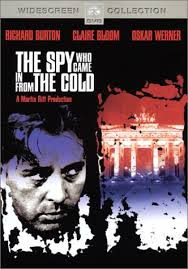
This is a heartbreaking little novel. It’s a plain and direct little story that attempts to recount one man’s ordinary life in the context of some kind of meaningful framework. In other words, this book could never, ever, ever, win the Booker. Unlike the last book I read, MOON TIGER, which curiously had the same basic materials, STONER attempts to honour the human search of meaning, and suggest that not all such searches are doomed to failure, which obviously makes it profoundly unfashionable.
William Stoner, the title character, is born on a poor farm: “It was a lonely household, of which he was an only child, and it was bound together by the necessity of its toil. In the evenings the three of them sat in the small kitchen lighted by a single kerosene lamp, staring into the yellow flame; often during the hour or so between supper and bed, the only sound that could be heard was the weary movement of a body in a straight chair and the soft creak of a timber giving a little beneath the age of the house.”
He is sent by his father to the university, to study agriculture, but once there a sophomore survey course in English literature changes his life, and he decides to become a teacher. The book then follows him through his unremarkable career, his mildly unhappy marriage, and then on to retirement and death. When summarised like that, I appreciate it does not seem like much of a read. But somehow it is such a beautiful account of ordinary troubles, and ordinary courage to overcome them, that it oddly touching. It reminds you that your life is a good deal more than an account of its incidents. Here he is, on his deathbed: “A kind of joy came upon him, as if borne in on a summer breeze. He dimly recalled that he had been thinking of failure – as if it mattered. It seemed to him now that such thoughts were mean, unworthy of what his life had been.”
It was 2am by this point, and I was gently drizzling on the sofa, with my face lit up by the blue light of my Kindle. It wasn’t just that the story was SOsad/happy, but also because it was so beautifully and simply written. It’s so rare to read something utterly unpretentious. I rolled my eyes when I read in the introduction the statement: “The clarity of the prose is in itself an unadulterated joy,” but by the time I went to bed I was forced to admit it was an unadaultered joy. It kind of makes you sorry you read it, because you just know the next book will be a disappointment.
Here’s the author’s view on what the book is about, which I don’t quite agree with, but which is interesting none the less:
A lot of people who have read the novel think that Stoner had such a sad and bad life. I think he had a very good life. He had a better life than most people do, certainly. He was doing what he wanted to do, he had some feeling for what he was doing, he had some sense of the importance of the job he was doing. He was a witness to values that are important . . His job give him a particular kind of identity and made him what he was . . .It’s the love of the thing that’s essential. And if you love something, you’re going to understand it. . . . I think it all boils down to what I was trying to get at in STONER. You’ve got to keep the faith. The important thing is to keep the tradition going, because the tradition is civilisation


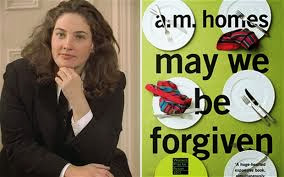

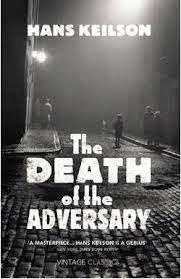
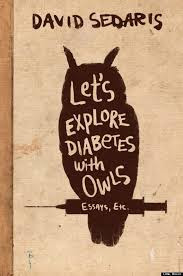 Regular readers of this blog may recall the period in which I was not sleeping, and so I took to my Sedaris. I started with a large print copy of WHEN YOU ARE ENGULFED IN FLAMES, which someone gave me, and then moved through all sorts of other Sedaris, from SANTALAND DIARIES to DRESS YOUR FAMILY IN CORDUROY AND DENIM. I decided recently to try LET’S EXPLORE DIABETES WITH OWLS, his latest, and OH DEAR. On my Kindle, if you go MENU – VIEW NOTES AND MARKS – the damning statement comes up: THERE ARE NO NOTES OR MARKS. David! What’s gone wrong! The master of the witty phrase and killing insight! Here’s what I think. His other stories were about his drug addicted, waster youth, and his messed up family. They were thus charming and comforting. Now, what does he have to write about? How he’s a best selling novelist? How he stays in chic hotels? How he has a stable relationship? I don’t think there’s any writer that could turn that kind of happy success into interesting material. However, I have hope. If he keeps writing like this he won’t be successful for too much longer . .
Regular readers of this blog may recall the period in which I was not sleeping, and so I took to my Sedaris. I started with a large print copy of WHEN YOU ARE ENGULFED IN FLAMES, which someone gave me, and then moved through all sorts of other Sedaris, from SANTALAND DIARIES to DRESS YOUR FAMILY IN CORDUROY AND DENIM. I decided recently to try LET’S EXPLORE DIABETES WITH OWLS, his latest, and OH DEAR. On my Kindle, if you go MENU – VIEW NOTES AND MARKS – the damning statement comes up: THERE ARE NO NOTES OR MARKS. David! What’s gone wrong! The master of the witty phrase and killing insight! Here’s what I think. His other stories were about his drug addicted, waster youth, and his messed up family. They were thus charming and comforting. Now, what does he have to write about? How he’s a best selling novelist? How he stays in chic hotels? How he has a stable relationship? I don’t think there’s any writer that could turn that kind of happy success into interesting material. However, I have hope. If he keeps writing like this he won’t be successful for too much longer . . 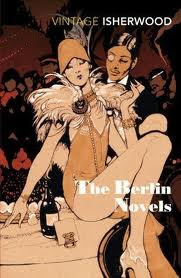 Christopher Isherwood is an English novelist who lived in Berlin as Hitler was coming to power, and these two novels capture that uncertain time. They tell the story of the various friends of one Christopher Isherwood, though he assures us that just because he has given his own name to the first person narrator “readers are certainly not entitled to assume that its pages are purely autobiographical” . Whatevs, Christopher Isherwood.
Christopher Isherwood is an English novelist who lived in Berlin as Hitler was coming to power, and these two novels capture that uncertain time. They tell the story of the various friends of one Christopher Isherwood, though he assures us that just because he has given his own name to the first person narrator “readers are certainly not entitled to assume that its pages are purely autobiographical” . Whatevs, Christopher Isherwood.